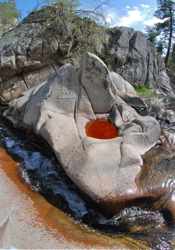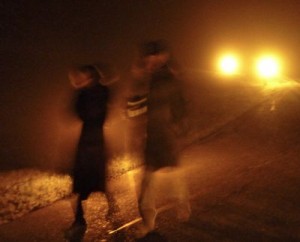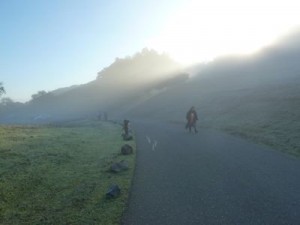Subtle Energy, Trauma & Transformation Part 5: Interpreting Energy Signals

Times of change are exciting and invigorating to the extent that we use them to make meaningful discoveries, adjustments, and connections with others. The ways we respond to change depend at least as much on how we position ourselves internally as it does on our life situation.
 Using the energy of change to transform depends on the way we manage our moment-to-moment experience.
Using the energy of change to transform depends on the way we manage our moment-to-moment experience.
How do we get from living our lives like business-as-usual to engaging fully with profound change? Strong energy signals that wake us up to the possibility or necessity of change usually take the form of some type of discomfort. These signals alert us that something different is going on. How we experience, embrace and respond to these signals is paramount. If we ignore, misinterpret, or shut them down we cannot use them for intentional transformation. Change will still occur, but with less awareness. We have more choice and possibility when we put ourselves in concert with the changes.
One way that intuitively sensitive people get clear is to ask ourselves: “What is my own in the energy, and what belongs outside of me?”
This is a great place to start when we feel strange. It is, however, easy to misinterpret uncomfortable sensations from the outer world as some sort of energy invasion. When world changes are intense, the energy fields around our bodies go through changes too. And why not? The relationship of the earth itself to its magnetic poles changed a bit with the tsunami. The government has had to change GPS settings. We really aren’t separate from all that.
Initially, during intense world changes, when I felt the fields around my body going through strange changes I had to really pause and evaluate what was happening. Like others experienced in working with energy, I went through a mental checklist to rule out common types of energy interference. I’m talking about the kinds of influence sensitive people take on from others. For example, when someone is throwing anger at you from a distance, pulling on your energy out of neediness, or projecting onto you issues they are unable to acknowledge in themselves, you may sense this energy coming at you and feel invaded. Even those who are fairly skilled may not find it easy to check our own subtle energy when our energy systems are compromised.
After ruling out the usual suspects I discovered that the fields around me were going through the equivalent of being stretched and thinned in places and pulled different ways, like a pizza crust in the hands of a chef.
As we become more sensitive and also more connected with the entire world our energy goes through changes. Unfamiliar sensations occur. These sensations are not totally unfamiliar, so we initially interpret them according to what we already know. We are unable to interpret them based on what we are not yet familiar with, so we make our best attempt. It is essential to stay open to new possibilities and to stretch toward new understanding.
Here are some unusual sensations that may occur when our fields are stretched, pulled and impacted by world changes. Some feel similar to energy invasion:
- fields feeling wispy, or weak
- disproportionate tiredness, which may feel like being drained
- bouts of dizziness
- nightmares
- periods of disorientation, brain-fog, or inability to focus
- inconsistent motivation
- sadness, shame, anger with yourself or others; the showing up of really old issues or inner wounds
- restlessness
- inability to access usual channels of guidance
- sense of losing your bearings or that life tools no longer work
- feeling that there is something in your fields that doesn’t belong or hasn’t been there before
Mental and emotionally you may feel:
- Nothing applies or makes sense
- Doubt
- Wondering whether we made a mistake
- Handling stress poorly
- Feeling unhappy with what you’re doing or like leaving your current circumstances
- Situations we have put up with for years may feel intolerable
- Strong desire for change, perhaps with no idea what to create
This type of sensation may come and go. When the cause is energy it’s important to remember that nothing is wrong. As you relax and adjust the sensations pass. Kind self-care is the best plan.In Post 6 we’ll explore the relationship between dynamic, changing energies and responsibilty, following in Post 7 with compassionate responses and actions that help us stay balanced through times of major change.
How does monumental world change impact YOUR day-to-day energy?
What do you do to increase your inner balance, clarity, or ease?





























